- Home
- Samuel Beckett
Dream of Fair to Middling Women Page 21
Dream of Fair to Middling Women Read online
Page 21
The hair of the homespun Poet did not lend itself kindly to striking effects of dressing, so closely was it cropped. Here again, in his plumping for the austerity of a rat's-back, he proclaimed himself in reaction against the nineties. But the little there was to do he had done, with a lotion he had given alertness to the stubble. And he had changed his tie. Now, though alone and unobserved, he paced up and down. He was making up his piece, almost an occasional one, whose main features he had established one recent gusty afternoon on the summit of the Hill of Allen. He would deliver it when his hostess came with her petition, he would not hum and haw like an amateur pianist nor yet as good as spit in her eye like a professional one. No, he would stand up at once and say—not declaim, state with gravity—with that penetrating Middle West melancholy like an ogleful of tears:
CALVARY BY NIGHT
the water
the waste of water
in the womb of water
an pansy leaps
rocket of bloom flare flower of night wilt for me
on the breasts of the water it has closed it has made
an act of floral presence on the water
the tranquil act of its cycle on the waste
from the spouting forth
to the re-enwombing
an untroubled bow of petal and fragrance
kingfisher abated
drowned for me
Lamb of my insustenance
till the clamour of a blue flower
beat on the walls of the womb of
the waste of
the water
Determined to put across this strong composition and make something of a stir, he was anxious that there should be no fault or flaw in the mode of presentation that he had adopted as being the best suited to his Hill of Allen manner. He must have it pat, so as to be able to not say it pat, so as to give the impression that in the travail of its exteriorisation he was torn asunder. Taking his cue from the humblest juggler who charms us by failing once, twice, and then the third time, in a positive lather of willing, bringing it off, he deemed that this little turn, if it were to go down at all, required stress to be laid not so much on the content of the performance as on the ordeal of spiritual evisceration endured by the performer. So he paced to and fro, making a habit of the words and effects of Calvary by Night.
* * *
The Frica combed her hair, back and back she raked her tresses till to close her eyes became a problem. The effect was throttled gazelle, more appropriate to evening wear than foal at foot. The Smeraldina-Rima, in the early stages of her campaign, when her face would still stand it, had favoured the same taut Sabine coiffure. Until Mammy, by dint of protesting that it made her little face look like a sucked lozenge, had persuaded her to fluff things a bit and crimp them. Alas! nimbed she was altogether too big dolly that opens and shuts her eyes. Nor indeed was lozenge, sucked or bucked, by any means the most ignoble office that the face of woman might discharge. For here at hand, saving us our fare to Derbyshire, we have the Frica, looking something horrid.
Throttled gazelle gives no idea. Her features, as though the hand of an unattractive ravisher were knotted in her chevelure, were all set at half-cock and locked in a rictus. She had frowned to pencil her eyebrows, so now she had four. The dazzled iris was domed in a white agony of entreaty. The upper-lip snarled away to the untented nostrils. Would she bite her tongue off?—that was the interesting question. The tilted chin betrayed a patent clot of thyroid gristle. It was impossible to put aside the dreadful suspicion that her flattened mammæ, in sympathy with this tormented eructation of countenance, had been exalted into two cutwaters and were rowelling her brassière. But the face was beyond suspicion, a flagrant seat of injury. She had only to extend the fingers of both hands so that the palm and fingers of the one touched the palm and fingers of the other and hold them thus joined before the breast with a slight upward inclination to look like a briefless martyress in rut.
Nevertheless the arty Countess of Parabimbi, backing through the press, would dangle into the mauve presence of the crone-mother, and “My dear” she would be positively obliged to ejaculate “naver have I seen your Caleken quite so striking. Quite Sistine!”
What would Madame be pleased to mean? The Cumaean Sibyl on a bearing-rein, sniffing the breeze for the Grimm brothers? Oh, she did not care to be so infernally finical and nice, that would be like working out how many pebbles in Tom Thumb's pocket, it was just a vague impression, it was just that she looked, with that strange limy hobnailed texture of complexion, so frescosa, from the waist up, my dear, with that distempered cobalt modesty-piece, a positive gem of ravished Quattrocento, a positive jewel, my dear, of sweaty Big Tom. Upon which the vidual virgin, well aware after all these years that all things in heaven, the earth and the waters were as they were taken, would return thanks to the Countess of Parabimbi for her erudite and gracious appreciations.
This may be premature. We have set it down too soon, perhaps. Still, let it stand.
It would be nice to go on sneering at the Frica, the long afternoon would slip over like a dream of water. What more agreeable way of getting through the hours of siesta than with itching point and graver to overcharge her with the stipplings and hatching of a fabricated indignation? Not sæva, fabricated. Alas, not at all sæva. If only it were possible to be genuinely annoyed with the girl. But it is not. Not for any length of time. No doubt she has her faults. Who has not? No doubt also she is someone's darling. Neither shall we, however that may be, condemn the damn girl further. She is dull, she is stale, she is not worthy of our steel. And anyhow there is the bell at last, pealing down her Fallopian pipettes, galvanising her away from the mirror as though her navel had been pressed in annunciation.
The Student, whose name we shall never know, was the first to arrive. A foul little brute he was, with a brow.
“Gracious goodness!” he exclaimed, for the benefit of the two Fricas, on the threshold of the mauve drawingroom “don't tell me I am the first!”
“Only” said Caleken, who could smell a poet against the wind, “by a short gaffe. Don't” she said coldly “distress yourself. You are not the only one.”
Hard on the heels of the Poet came a gaggle of nondescripts, then a young pastoralist, then a Gael, an Irish one, then the Shawly with her Chas. Him the Student, mindful of his vow, buttonholed.
“In what sense” he demanded, without exordium, “did you use sense when you said…”
“He said that?” exclaimed the pastoralist.
“Chas” said the Frica, as though she were announcing a score.
“Adsum” said Chas.
A plum of phlegm burst in the vestibule.
“What I want to know” complained the Student “what we all want to know, is in what sense he was using sense when he said…”
The Gael was endeavouring to transmit Camden Street's thought for the day to the Freudlose Witwe for the benefit of the nondescripts.
“Owen…”he began, when an anonymous ignoramus anxious to come into the picture as early on in the proceedings as possible said rashly:
“What Owen?”
“Good-evening” gushed the Polar Bear “good-evening good-evening good-evening. Wat a night, Madame” he addressed himself vehemently, out of sheer politeness, directly to his hostess, “God, wat a night.”
Now she had great gradh for him.
“And you so far to come!” She was sorry she could not croon it frankly, nor lay her claw tenderly on his shabby sleeve. He was a shabby man, and often moody. “So good of you to come” as fondly as she durst “so good of you.”
The Man of Law was next, accompanied by the Countess of Parabimbi and three tarts dressed for the back-stairs.
“I met him” whispered Chas “staggering down Pearse Street, Brunswick Street you know, that was.”
“En route?” said the Frica.
“Hein?”
“On his way here?”
“Well” said Chas “my dear Miss Frica, I f
ear that he did not make clear to me if he is coming or not.”
The Gael said to the P.B. in an injured voice:
“Here's a man who wants to know what Owen!”
“Not possible!” said the P.B. “you astonish me.”
“Is it of the sweet mouth?” said a sandy son of Han.
Now the prong of the Polar Bear's judgement was keen and bright.
“That emmerdeur!” he jeered. “The strange sweet mouth!”
The Countess of Parabimbi started back. “You said?” she said.
The Frica emerged from the ruck, she came to the fore.
“What can be keeping the girls” she said. It was not exactly a question.
“And your sister” enquired the pastoralist “your charming sister, where can she be, I wonder.”
“Unfortunately” said the Beldam, precipitately, “in bed, unwell. A great disappointment for us all.”
“Nothing serious, Madame,” said the Man of Law “let us hope?”
“Thank you, no. Happily not. A slight indisposition. Poor little Pissabed!”
Madame passed a heavy sigh.
The Polar Bear looked significantly at the Gael.
“What girls?” he said.
“Pansy”—the Poet's heart went pit-a-pat—”Lilly Neary, Olga, Miriam, Alga, Ariana, tall Tib, slender Sib, Katty, Alba…” they were too numerous for the harried Frica to name.
“Alba!” ejaculated the P.B. “Alba! She!”
“And why” interposed the Countess “not Alba, whoever she may be, rather than, say, the Wife of Bath?”
A nondescript came up with the good tidings. The girls had arrived.
“They are girls” said the pastoralist “beyond any doubt. But are they the girls?”
By God, they were girls, he was quite right. But were they the girls.
“I suppose we can start now” said Frica the younger and, the elder being aware of no let or hindrance, up on to the estrade smartly she stepped and unveiled the refreshments. Then, turning her back on the high dumb-waiter, with a great winged gesture of lapidated piety, she instituted the following variety:
“Claret-cup! Lemon-squash! Tea! Coffee! Cocoa! Oval-tine! Force!”
“Great cry” said the pastoralist “and little wool.”
The more famished faithful surged towards her.
Two novelists, a bibliomaniac and his mistress, a paleographer, a violist d'amore with his instrument in a bag, a popular parodist with his sister and six daughters, a still more popular professor of Bullscrit and Comparative Ovoidology, the macaco the worse for drink, an incontinent native speaker, a prostated arithmomaniac, a communist decorator just back from the Moscow reserves, a merchant, two grave Jews, a rising whore, three more poets with Lauras to match, a disaffected cicisbeo, the inevitable envoy of the Fourth Estate, a phalanx of Grafton Street Stürmers and Jem Higgins arrived now in a body. No sooner had they been assimilated than the Parabimbi, very much the lone bird on this occasion in the absence of her husband the Count who had been unable to escort her on account of his being b--- if he would, got in her attributions of the Frica for which, as has been shown, she was carefully thanked by the beldam.
“I do no more” said the Countess “than constate.”
She held the saucer under her chin like a communion-card. She lowered the cup into its socket without a sound.
“Excellent” she said “most excellent Force.”
Madame Frica smiled from the teeth outward.
“So glad” she said “so glad.”
The Professor of Bullscrit and Comparative Ovoidology was not to be seen. But that did not matter, that was not his business, that was not what he was paid for. His business was to be heard. He was widely and clearly heard.
“When the immortal Byron” he bombled “was about to leave Ravenna, to sail in search of some distant shore where a hero's death might end his immortal spleen…”
“Ravenna!” exclaimed the Countess, memory tugging at her carefully cultivated heart-strings, “Did I hear someone say Ravenna?”
“Allow me” said the rising whore “a sandwich. Egg, tomato, cucumber.”
“Did you know” blundered the Man at Law “that the Swedes have no fewer than seventy varieties of Smörrbröd?”
The voice of the arithmomaniac was heard:
“The arc” he said, stooping to all in the great plainness of his words, “is longer than its chord.”
“Madame knows Ravenna?” said the paleographer.
“Do I know Ravenna!” exclaimed the Parabimbi “Sure I know Ravenna. A sweet and noble city.”
“You know of course” said the Man of Law “that ‘twas there that Dante died?”
“To be sure” said the Parabimbi “so he did.”
“You know of course” said the paleographer “that his tomb is in the Piazza Byron? I translated his epitaph into heroic couplets.”
“You know of course” said the Man of Law “that under Belisarius…”
“My dear” said the Parabimbi to the beldam “how well it goes! What a happy party and how at home they all seem. I declare” she declared “I envy you your flair for making people feel at their ease.”
The beldam disclaimed faintly any such faculty. It was Calaken's party really. It was Calaken who had arranged everything really. She had had very little to do with the arrangements. She just sat there and looked mauve and exhausted. She was just a weary exhausted old Norn.
“To my mind” boomed presumptuously the ovoidologist “the greatest triumph of human thought was the calculation of Neptune from the observed vagaries of the orbit of Uranus.”
“And yours” said the P.B. That was an apple of gold and a picture of silver if you like.
The Parabimbi waxed stiff.
“Who's that?” she cried. “What does he say?”
A terrible hush fell upon the assembly. The macaco had slapped the communist decorator.
Supported by Mr Higgins the Frica was on the scene of the disturbance at once.
“Go” she said to the macaco “and let there be no scene.”
Mr Higgins led him away. The Frica now addressed herself to the decorator. “I do not propose” she said “to tolerate any political brawls at any party of mine.”
“He called me a bloody Bolshy” protested the decorator “and he a labour man himself.”
“Let there be no more of it” said the Frica “let there be no more of it.”
She was very optative. “I beg of you” she said, and stepped back fleetly to the altar.
“You heard what she said” said the Gael.
“Let there be no more of it” said the native speaker.
“I beg of you” said the Polar Bear.
But now the lady cometh that all this may disdain, the Alba, dauntless daughter of desires. She made her entry just on the turn of the hush, she advanced like a midinette to pay her respects to the beldam, and voices sprang up in her wake. She suffered herself to be presented to the Parabimbi and then, without further ado, she mounted the estrade and there, in profile to the assistance, silent and still before the elements of refreshment, she cast her gravitational nets.
The rising whore studied how to do it. The daughters of the parodist passed on to such as were curious the little they knew. She was much spoken of in certain circles to which they had access. But how much of what one heard was true and how much mere gossip they were really not in a position to say. However, for what it was worth, it appeared…
The Gael, the incontinent native speaker, the reporter and the violist d'amore got together as though by magic.
“Well?” invited the reporter.
“Pret-ty good” said the Gael.
“Dee-licious” said the violist d'amore.
The incontinent native speaker said nothing.
“Well?” repeated the reporter “Larry?”
Larry turned his eyes away from the estrade at last and said, drawing his palms slowly up the thighs of his trousers:
&n
bsp; “Jaysus!”
“Meaning?” said the reporter.
Larry turned his wild gaze back upon the estrade. “You don't happen to know” he said finally “does she do it?”
“They all do” said the violist d'amore.
“Like hell they do” said the Gael.
“What I want to know” said the Student “what we all want to know…”
“Some do abstain” said the reporter “our friend here is right, through bashfulness from Venery. It is a pity, but it is so.”
From widely divergent points the Polar Bear and Mr Higgins approached the estrade.
“You look pale” said the Frica “and ill, my dear.”
The Alba raised her big head from the board and looked longly at the Frica.
“Pale” she repeated “and ill. Then keep them away.”
“Keep them away!” echoed the Frica “keep whom away?”
“Who is here?”
“Chas, Jem, the Polar Bear…”
The Frica was anxious to calm her. Such stories were related of the Alba. It was always to be feared that she would make a scene. Tricks and turns and games were food and drink to the Frica. The party, as far as she was concerned, did not begin to be a party until the tricks and turns and games started. Scenes only held up things, besides risking to frighten people away. One on whom she might count, Chas or a willing poet or musician, for a little contribution if all were going quietly and smoothly, might well be frightened away by the unpleasantness of a scene.
“We go through the world” said the Alba “like sunbeams through cracks.”
“The Polar Bear” said the Frica, thoroughly alarmed, “you know, and Jem of course I know you know. Take a little cup, dear, it will do you good.”
“Keep them away!” cried the Alba, clenching the altar, “keep them away.”
But the P.B. and Jem were on the estrade. They closed in upon her.
“All right” said the Alba “make it a strong one.”
Phew! the Frica was inexpressibly relieved.
Half-nine. The guests, led by the rising whore and the cicisbeo, began to scatter through the house. The Frica let them go. In half-an-hour she would visit the alcoves, she would round them all up for the party proper to begin. Had not Chas promised a piece of old French? She had seen the viol d'amore in its bag in the hall. So they would have a little music.

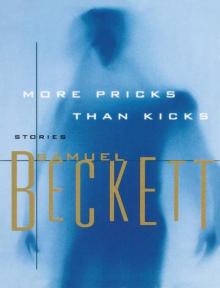 More Pricks Than Kicks
More Pricks Than Kicks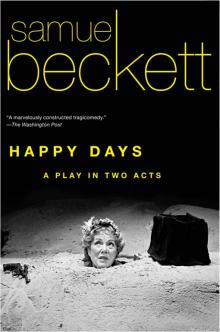 Happy Days
Happy Days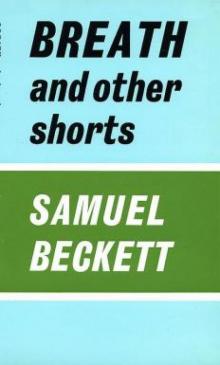 Breath, and Other Shorts
Breath, and Other Shorts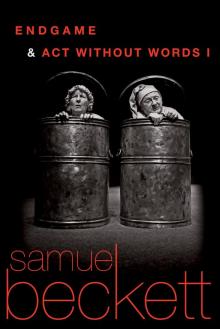 Endgame & Act Without Words
Endgame & Act Without Words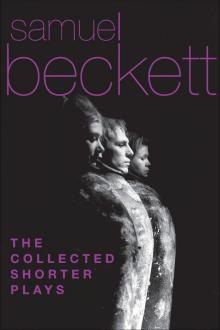 The Collected Shorter Plays of Samuel Beckett
The Collected Shorter Plays of Samuel Beckett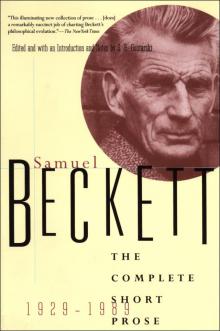 The Complete Short Prose, 1929-1989
The Complete Short Prose, 1929-1989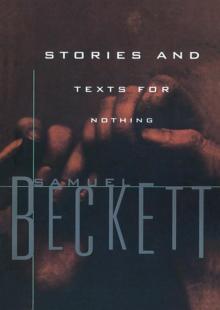 Stories and Texts for Nothing
Stories and Texts for Nothing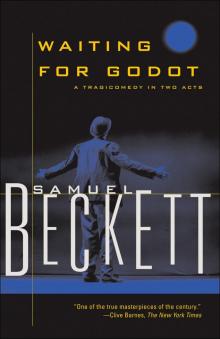 Waiting for Godot
Waiting for Godot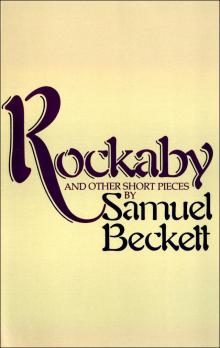 Rockaby and Other Short Pieces
Rockaby and Other Short Pieces First Love and Other Shorts
First Love and Other Shorts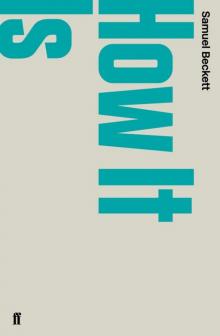 How It Is
How It Is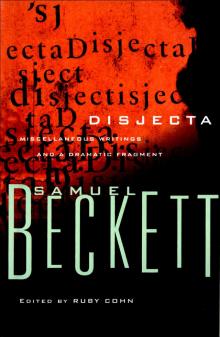 Disjecta: Miscellaneous Writings and a Dramatic Fragment
Disjecta: Miscellaneous Writings and a Dramatic Fragment Echo's Bones
Echo's Bones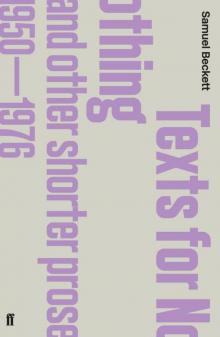 Texts for Nothing and Other Shorter Prose 1950-1976
Texts for Nothing and Other Shorter Prose 1950-1976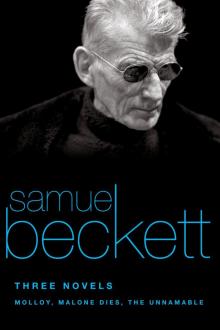 Three Novels
Three Novels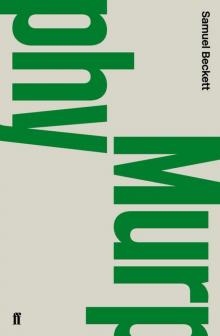 Murphy
Murphy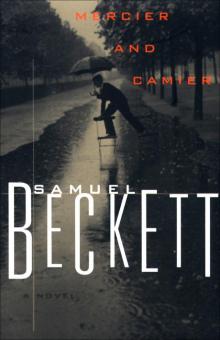 Mercier and Camier
Mercier and Camier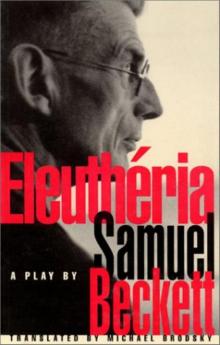 Eleuthéria
Eleuthéria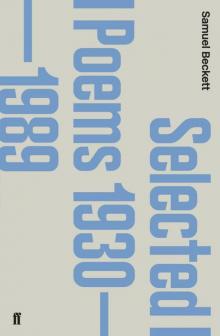 Selected Poems 1930-1988
Selected Poems 1930-1988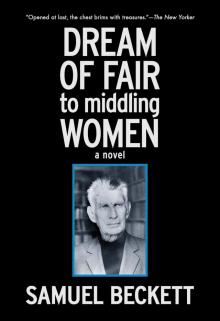 Dream of Fair to Middling Women
Dream of Fair to Middling Women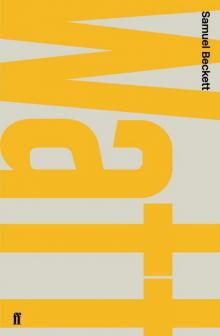 Watt
Watt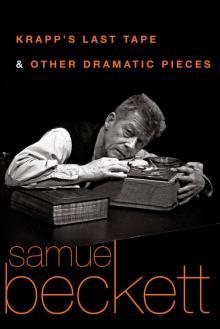 Krapp's Last Tape and Other Dramatic Pieces
Krapp's Last Tape and Other Dramatic Pieces The Complete Dramatic Works of Samuel Beckett
The Complete Dramatic Works of Samuel Beckett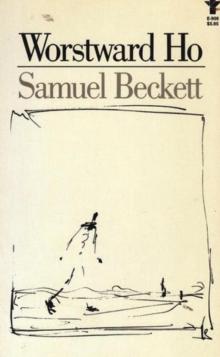 Worstward Ho
Worstward Ho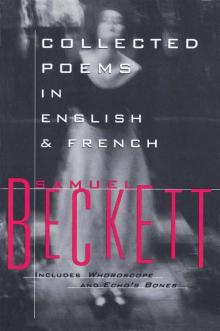 Collected Poems in English and French
Collected Poems in English and French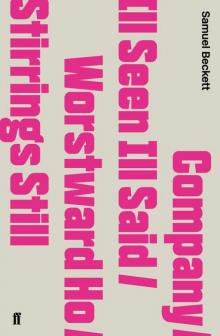 Company / Ill Seen Ill Said / Worstward Ho / Stirrings Still
Company / Ill Seen Ill Said / Worstward Ho / Stirrings Still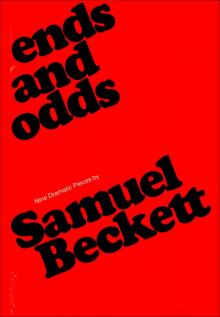 Ends and Odds
Ends and Odds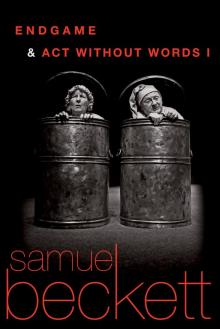 Endgame Act Without Words I
Endgame Act Without Words I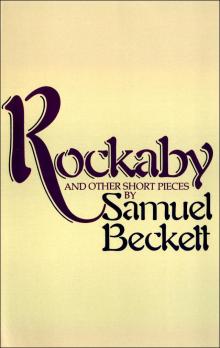 Rockabye and Other Short Pieces
Rockabye and Other Short Pieces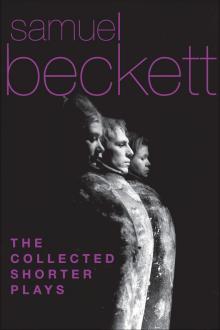 The Collected Shorter Plays
The Collected Shorter Plays The Complete Dramatic Works
The Complete Dramatic Works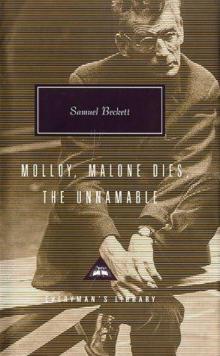 Three Novels: Malloy, Malone Dies, The Unnamable
Three Novels: Malloy, Malone Dies, The Unnamable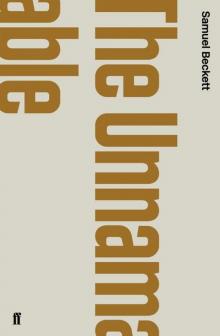 The Unnamable
The Unnamable